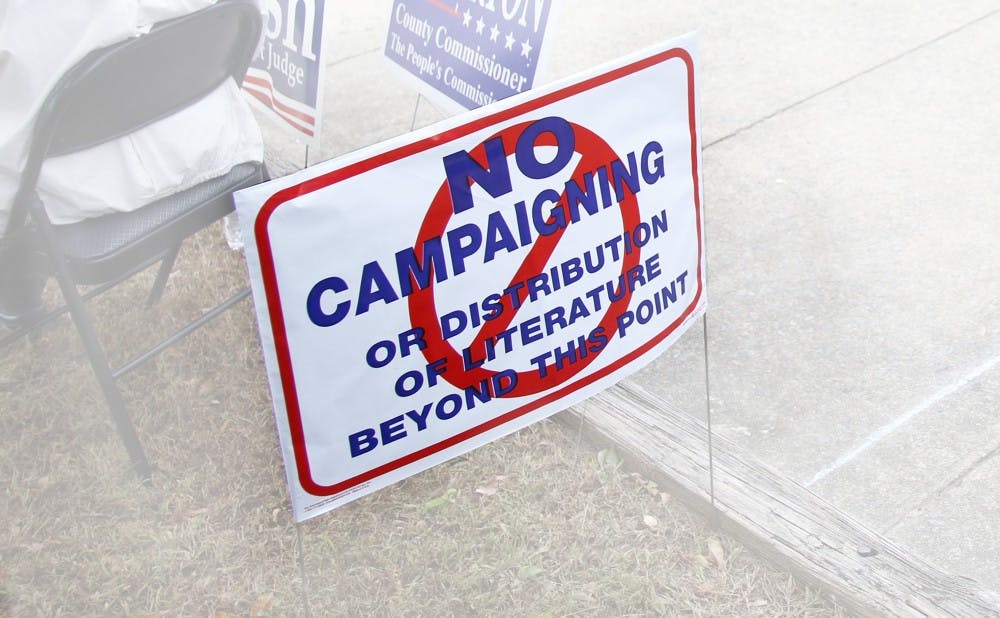When it comes to Duke professors sharing political views, the rules get a little blurry.
According to the University's “Campus Political Activity and Engagement with Federal Officials” guide, “no Duke resources—including personnel, email accounts, copiers, office space, vehicles or publications—may be used for political purposes.” These restrictions, however, do not apply to employees voicing opinions with their own personal resources and on their own time.
“Every individual at Duke has the right to express their political viewpoints in their personal life and to speak about issues of interest and concern to them,” said Michael Schoenfeld, vice president of public affairs and government relations. “The only thing that is forbidden is using Duke resources for partisan political activity.”
In theory, this distinction might seem clear cut. In practice, however, professors said there is some ambiguity.
Michael Gillespie, professor of political science, said that he was not aware of relevant restrictions on professors sharing political views. He referenced academic tenure as a possible loophole to University guidelines.
“People have tenure, they go on tenure-track positions, there’s no grounds for firing them," Gillespie said. "I’ve been here for 33 years, and I’ve never run across any [guidelines].”
The existence of clear cut guidelines to professors’ dialogue may not matter—Duke faculty and staff are generally liberal, noted Charles Clotfelter, Z. Smith Reynolds professor of public policy studies.
“Research shows that a majority of faculty in top research universities are liberal—Democrats—versus conservative—Republicans,” Clotfelter said. “That is just a fact of the labor market. What we insist on at Sanford is that professors treat every student with respect, and that includes showing respect to sincerely expressed political views.”
As such, many professors attempt to showcase a wide range of views in their discussions. Peter Feaver—professor of political science and public policy and a veteran of the George W. Bush administration—noted that he makes an effort to reflect different positions in his lectures.
Bipartisanship is important to a Duke education, noted Eric Mlyn, assistant vice provost for civic engagement and Peter Lange executive director of DukeEngage.
“I have always been committed to creating learning environments for our students—whether in the classroom or in the field—that allow a diversity of viewpoints to be represented,” Mlyn said, despite his own "very strong" personal politics.
However, Mlyn noted he was struggling to "draw the line" in this particular election cycle.
Gillespie emphasized that universities are supposed to be places of free speech where people can express their opinions.
He questioned whether Google mail is more of a "bastion of free speech than Duke University" if the current formal restrictions require professors to separate Duke and private email accounts for voicing political views.
Some people on campus noted that free speech for nontraditional viewpoints could be compromised.
“Over the years, I have experienced countless times what are today called ‘micro-aggressions,’” said Feaver, regarding his experience in being characterized as a “token Republican.”
Such bias stems from “a diversion from the norm,” noted senior Adam Lemon, former chair of Duke College Republicans.
“Academia tends to be very liberal, probably the only career industry on a whole that’s more liberal than journalists,” he said.
There is also no formal complaint process if people feel professors are improperly sharing their political positions. Schoenfeld noted that if students have a concern about a professor voicing his or her opinion in the classroom, they should talk to the professor and the appropriate dean, the same procedure for any issue.
On the question of balancing political expression and academic integrity, Schoenfeld said that there was no easy answer.
“Our policy is very clear that individuals have the rights to express their point of view, but anyone who expresses a point of view is also responsible for defending it," he said.
The bigger issue, though, may simply be a lack of awareness regarding regulations in general.
“I was unaware of the Duke guidelines until you pointed them out to me,” said Richard Schmalbeck, professor of law. “Obviously, [professors] would not consider them if they don’t know about them."
Get The Chronicle straight to your inbox
Signup for our weekly newsletter. Cancel at any time.

